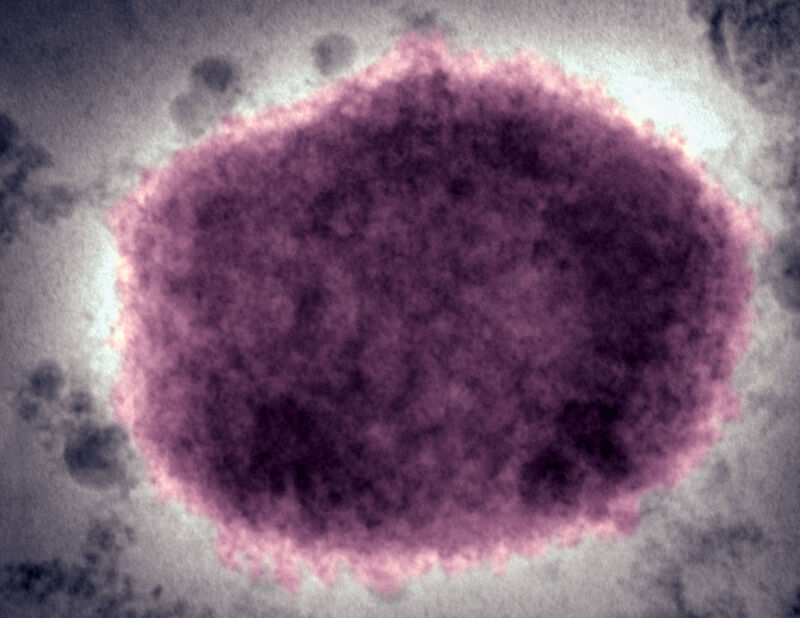

Monkeypox outbreak spurs WHO to consider declaring international emergency
source link: https://arstechnica.com/science/2022/06/monkeypox-outbreak-spurs-who-to-consider-declaring-international-emergency/
Go to the source link to view the article. You can view the picture content, updated content and better typesetting reading experience. If the link is broken, please click the button below to view the snapshot at that time.

possible emergency —
Monkeypox outbreak spurs WHO to consider declaring international emergency
WHO will also rename the disease, because the current name is discriminatory.
Beth Mole - 6/14/2022, 8:54 PM

The World Health Organization will convene its emergency committee of expert advisors Thursday, June 23, to consider whether it should declare the growing, multinational monkeypox outbreak a public health emergency of international concern (PHEIC).
As of Tuesday, June 14, WHO has received reports of more than 1,600 confirmed monkeypox cases and almost 1,500 suspected cases from 39 countries. Those countries include eight in which monkeypox infections were previously known to spill over from animals, and 32 newly affected countries, most of which are in Europe, but also include Australia and countries in the Americas and Eastern Mediterranean.
There have been 72 monkeypox deaths reported this year from African countries that have long been affected by limited spillovers. So far, there are no confirmed deaths among cases in newly affected countries, but WHO is seeking verification of a reported monkeypox-related death in Brazil.
"The global outbreak of monkeypox is clearly unusual and concerning," WHO Director-General Dr. Tedros Adhanom Ghebreyesus said in a press briefing Tuesday. For that reason, Tedros decided to convene the emergency committee to determine if it constitutes a PHEIC.
A PHEIC is WHO's highest level of alarm. The United Nations agency defines a PHEIC as "an extraordinary event which is determined to constitute a public health risk to other States through the international spread of disease and to potentially require a coordinated international response." This definition implies a situation that is "serious, sudden, unusual or unexpected." Previous events that reached the level of PHEIC include the current COVID-19 pandemic, the Zika outbreak of 2016, and the 2014 to 2016 West Africa Ebola epidemic.
In the press briefing Tuesday, Tedros boiled down the definition of a PHEIC to three primary criteria: that the situation is unusual, is affecting multiple countries, and would benefit from collaboration and coordination.
Advertisement"I think it's now clear that there is an unusual situation, meaning even the virus is behaving unusually from how it used to behave in the past," Tedros said. "But not only that, it's also affecting more and more countries, and we believe that it needs some coordinated response because of the geographic spread."
Unusual outbreak
By saying the virus behaves differently in this outbreak, Tedros was referring to the apparent spread through sexual networks, largely among men who have sex with men. Monkeypox has long been known to spread primarily through direct skin-to-skin contact or prolonged, intimate face-to-face contact, both of which occur during various sexual activities. But, monkeypox is not considered a sexually transmitted infection in the classic sense. It's still unclear if the virus can spread via semen or vaginal fluids, specifically.
Further, monkeypox was previously seen as a virus that's not easily spread from person to person. But, now it seems to be spreading quite readily through sexual networks in the current outbreak. Generally, the virus is known to be present in wild animals in Central and Western African countries and has occasionally spilled over to humans, typically producing only small, self-limiting outbreaks. Some of the longest previously documented outbreaks have included just six to nine successive jumps from person to person before fizzling out. Those most at risk of infection are health care workers and family members who have intimate contact with an infected person.
Another unusual aspect of this outbreak is the spectrum of symptoms. Classic symptoms of monkeypox include an early flu-like phase followed by the development of lesions that spread all over the body, concentrating on the extremities, including the face, palms of the hands, and soles of the feet. But in the current outbreak, some infected people do not experience an early flu-like phase or don't get it initially. Some have reported much milder and limited lesions—often starting in the anal and genital areas. As such, clinicians have reported that cases in the current outbreak can be hard to distinguish from common sexually transmitted infections, such as syphilis, chlamydia, and gonorrhea.
With the unusual aspects of the outbreak, the growing list of countries affected, and the need for collaboration, the three criteria for a PHEIC are "very, very clear now," Tedros said.
Recommend
About Joyk
Aggregate valuable and interesting links.
Joyk means Joy of geeK